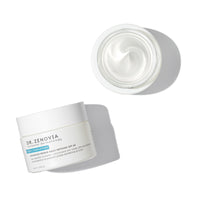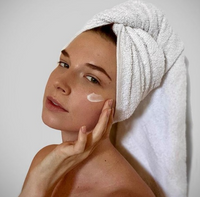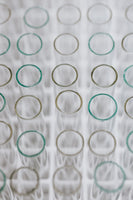The Role of the “Love Hormone” On Our Skin’s Health

The "Love Hormone"
Falling in love may feel like magic, but our internal hormones and physiology are playing a major role behind the scenes. Oxytocin, popularly known as the “Love Hormone” or “Attachment Hormone”, is a complex and fascinating chemical produced by the hypothalamus (the deep brain) and secreted by the pituitary gland. This hormone has been studied at length for its role in the birthing process and nursing. Oxytocin induces labor and is released into a mother’s brain during nursing. In this way, oxytocin helps bond a new mother to her baby- this is where women feel an overwhelming sense of love and protection for their offspring. Evolutionarily, mothers who had a strong oxytocin effect were protective and took care of their young so they had a better chance of surviving the harsh world. Conversely, mothers who didn’t feel bonded to their young (low oxytocin perhaps) didn’t protect and care for their offspring so those infants perished and their genetic pool did not propagate. Oxytocin has remained a vital hormone for human survival.
Hugging friends or making eye contact with others also stimulates the release of this hormone. When it comes to romance, oxytocin is released after having intercourse and grows between couples that have had a long-standing connection.
Studies have demonstrated that women and men have heightened levels of this hormone after orgasm. Hence the feeling of “love” or “affection” that follows after sex. Evolutionarily, a couple that mated needed to potentially depend on each other and possibly raise a child together, so oxytocin was necessary to help form this bond between two individuals who were mating.
It is important to note that oxytocin doesn’t work on its own. There is a cocktail of neurotransmitters including dopamine that function together to help create a bond with those around us. These hormones also help regulate our mood, promoting pleasure and positive feelings. Dopamine is the pleasure chemical released during early romance that gives us that rush that comes with new love, while oxytocin is more involved in bonding and long-term connection.
Oxytocin’s Impact on Skin Health
Once produced, oxytocin can impact our emotions and in turn our skin’s health. Oxytocin can help us feel more relaxed, reducing stress and anxiety levels. Stress management is key to healthy skin because many skin conditions can flare with excessive stress including eczema, psoriasis, rosacea, and acne. Oxytocin helps us feel less stressed which can lower our cortisol (stress hormone) levels. Oxytocin is extremely high in female bodies after giving birth, giving women that postpartum glow!
Oxytocin also promotes skin healing and boosts our immunity, helping to reduce inflammatory factors. This physiologic effect also makes our skin look better. Less inflammation and less inflammatory skin disorders lead to less acne! Overall, oxytocin helps our skin indirectly but has a significant effect, nonetheless.
Increasing Your Oxytocin Levels
Our bodies naturally produce oxytocin, but if you want more of this “happy hormone” some ways to promote production include hugging, cuddling, kissing, and sexual intimacy. Other ways to increase your oxytocin levels include practicing yoga or meditation, listening to music, getting a massage, petting your dog, performing acts of kindness, and spending quality time with loved ones.
Our bodies are incredible machines that have evolved to experience a range of emotions that are critical to survival and move us toward a more sustainable existence. Oxytocin is our glow hormone- it makes us feel a connection, brings out our humanity, and in turn, makes our skin beautiful.
Have an amazing Valentine's Day!
Learn How to Treat & Prevent Stress Induced Acne









Leave a comment